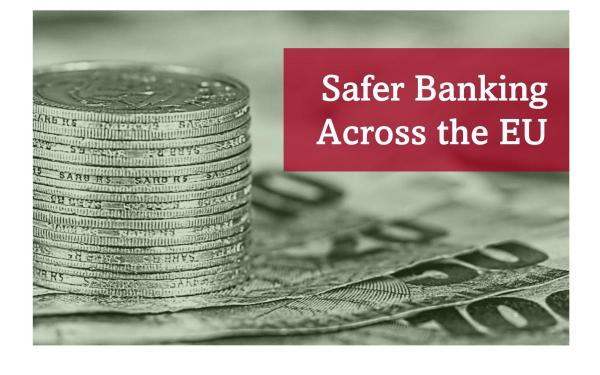Banking in the European Union

Banking in the EU has become much easier and more user-friendly with the introduction of EC Regulation 2560/2001 which deals with cross-border payments.
Protection for Cross-Border Payments
The European Parliament and the Council of the European Union have adopted the Regulation on cross-border payments in Euro (EC) No 2560/2001.
The main objective of the Regulation is to protect the consumer by preventing institutions from charging more for certain cross-border payments in euro than for corresponding payments in euro processed within the Member State. Further to this the Regulations require institutions to be transparent with their charges for such payments and to provide International Bank Account Numbers (IBAN) and Bank Identifier Codes (BIC) in order to facilitate cross-border credit transfers. An institution is defined as “any natural or legal person which, by way of business, executes cross-border payments.”
The Regulation applies to cross-border payments in euro up to €50,000 within the EU. Cross-border payments are credit transfers, cash withdrawals at cash dispensers and payments by means of debit and credit cards. The Regulation does not apply to payments made by cheque, as there is no central cheque clearing system within the euro area. Cheques and bank drafts accordingly entail higher processing costs.
The three main provisions of the Regulation that institutions have to comply with are:
-
Charges for Cross-Border Electronic Payment Transactions and Credit Transfers
This Article requires institutions to charge the same for cross-border electronic payment transactions and cross-border credit transfers in euro as they do for corresponding domestic payments in those respective currencies.
-
Transparency of Charge
Institutions are to make available to their customers prior information on the charges levied for cross-border payments in euro and for payments in those currencies effected within the Member State in which the establishment is located. This is to be done in a readily comprehensible form, in writing, and where appropriate, in accordance with national rules, by electronic means. Institutions are also to communicate any modification of the charges in the same way, in advance of the date of application; and where institutions levy charges for exchanging currencies into and from Euro, institutions shall provide their customers with prior information on all the exchange charges which they propose to apply and specific information on the various exchange charges which have been applied.
-
Measures for Facilitating cross-border Transfers
Institutions are to communicate, where applicable, to each customer upon request his International Bank Account Number and that institution’s Bank Identifier Code. From 1 July 2003, institutions were required to indicate on statements of account of each customer their International Bank Account Number and the institution’s Bank Identifier Code.
Non-Eurozone Currencies
Article 9 of the Regulation allows non-eurozone Member States to opt transactions denominated in their currencies into the scope of the Regulation if they so wish. Sweden has exercised this option, Denmark and the UK have decided not to. Therefore cross-border payments in Swedish krona will have the benefit of these regulations, while payments in Sterling will not.
If Something Goes Wrong
Report the problem immediately to your bank branch. Many problems can be sorted out quickly and simply in this way but if you are still not satisfied, you should make a formal complaint. Briefly state the facts, relevant dates and what solution you would like. If you are sending documentation, always keep a copy of everything you send for your own records.
You need to allow the bank a reasonable time to reply. However, if your complaint is not resolved you can refer your complaint to the Financial Ombudsman Service. The Financial Ombudsman Service will provide advice and assistance in all cases where the financial institution is regulated by the Financial Services Authority.
Fin-Net
If the company you are in dispute with is based in the European Economic Area (EEA - EU countries plus, Iceland, Norway and Liechtenstein), you could contact your local Fin-Net office. Fin-Net are the financial dispute resolution network that provide an out-of-court dispute resolution service. In the UK, Fin-Net is provided by the Financial Ombudsman Service.